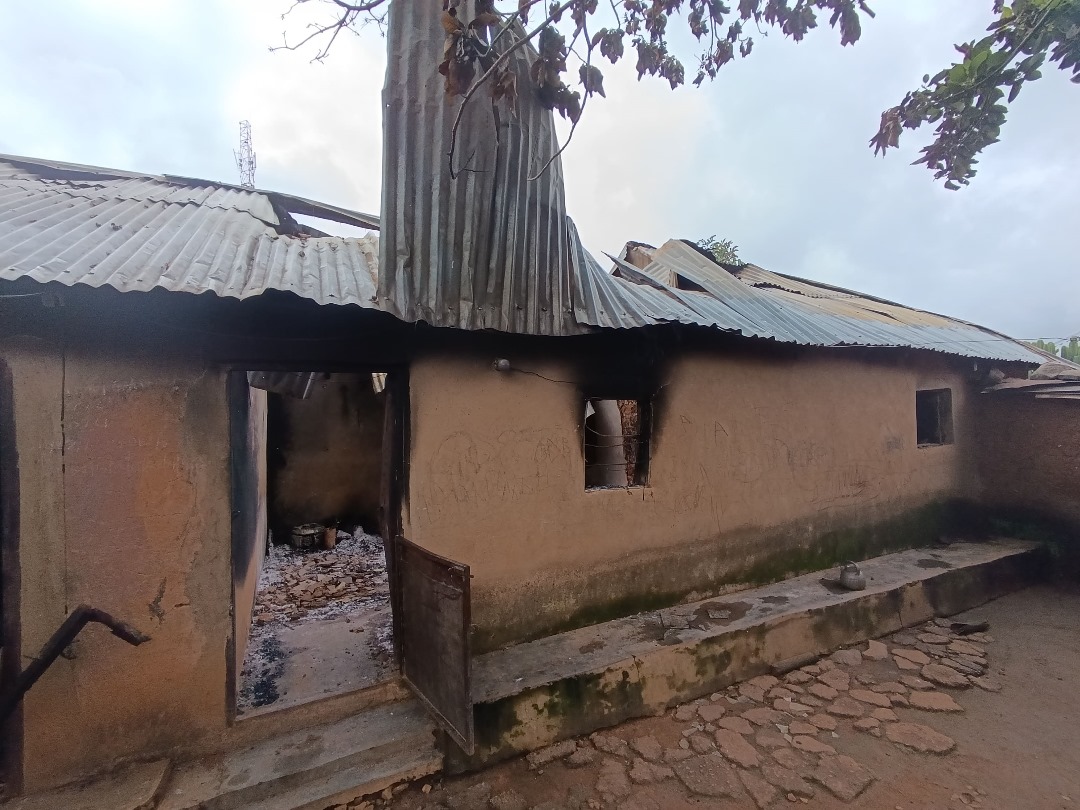INVESTIGATION: How Armed Fulani Militants Executed Coordinated Attack While Nigerian Army Allegedly Provided Safe Passage
Part One of Two-Part Investigation
By Middle Belt Times Investigative Team
A Community Under Siege
The morning sun stretched long shadows over what was left of Rev. Davou Musa’s house in Bindi village—a stark reminder of the nightmare that struck in the early hours of July 15, 2025. This quiet Christian farming community sits in the green plains of Riyom Local Government Area, Plateau State, but now the air hangs heavy with the bitter smell of smoke and destruction, leaving behind too many unanswered questions.
When Middle Belt Times (MBT) arrived in Bindi on Monday, July 21, the village bore the hallmarks of a community traumatized. Only men remained on the grounds, their weathered faces etched with grief and anger. The women and children had fled after the devastating attack that claimed 27 lives, leaving behind a ghost town of mud houses and shattered dreams along the Jos-Abuja highway, just 30 miles from the state capital.
A Community’s Peaceful Existence Shattered
Bindi Tahoss community, home to approximately 1,000 residents living in 160 mud houses—some crowned with traditional thatch roofs—had been a picture of rural tranquility. The temperate climate, reminiscent of European cities, created ideal conditions for diverse vegetable cultivation, sustaining a population of subsistence farmers who had coexisted peacefully with their surroundings for generations.
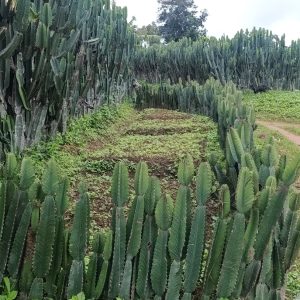
“We have never had any misunderstanding with the Fulani,” Simon Davou told MBT, his voice carrying the bewilderment of a man whose world had been turned upside down without warning. “They graze around our community, but we have never had any reason to disagree with them over the years. Sometimes they graze into our farmlands and destroy our crops, but that is a reality we have learned to live with over the years.”
The community’s only protection came from an unusual source—cactus walls encircling the small settlement. “These cactus plants are our only form of security,” Rev. Davou Musa explained to MBT, gesturing toward the thorny barriers that had proven tragically inadequate against the coordinated assault that would follow.
Simon Davou’s words reveal the resigned acceptance of a vulnerable community: “There are times they attack our people in their farms, but what can we possibly do? We are a small community of about 160 houses. There is no police station or any security agency stationed here, so we overlook most of these issues by the Fulani herdsmen.”
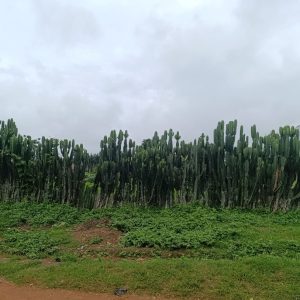
The Calm Before the Storm: July 14 Warning Signs
The sequence of events that led to the massacre began on July 14, when women and children working their farms spotted an unusual gathering. Large numbers of Fulani herders were accompanied by unidentified men dressed in black clothing—a sight that immediately triggered alarm bells in the peaceful community.
“The women screamed to draw the attention of members of the community, whistles were blown across the community, and the herdsmen fled,” Rev. Musa recounted to MBT. “When they fled, we all thought they had gone, but by 4 pm, they returned, and the information went round our community that there was a threat in the community, and they were identified as Fulani from Hayin Bangai, a community about a mile from our community. You can see the community from here, over there.”
Google map obtained by MBT confirms Bangai’s proximity—less than a mile south of Bindi. More significantly, MBT investigations revealed that a prominent leader of the Miyetti Allah Cattle Breeders Association of Nigeria (MACBAN) maintains a house in Bangai of Bachit district, raising questions about MACBAN’s role in the attack among residents of Bindi.
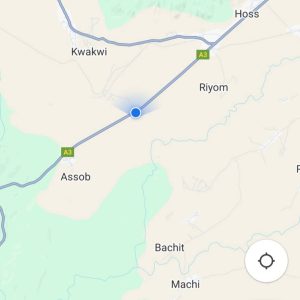
The community’s response to the threat was swift and followed proper channels. “On that evening of July 14, we tried and informed the security about the movements of people that we don’t understand in our community,” Rev. Musa explained. “We called our Ward councillor, who then called the guard commander of the Nigerian army immediately. The commander sent some soldiers at about 5 pm on 2 gun trucks. We were all happy and confident since we saw the army in our community, and we went about our activities.”
The Army’s Brief Presence Hours before Attack
The arrival of Nigerian Army personnel brought temporary relief to Bindi residents. The sight of two gun trucks and soldiers patrolling their community provided a sense of security that would prove devastatingly false. At approximately 7 pm on July 14, the first signs of trouble emerged.
“At about 7 pm, we began to hear gunshots from the major road that passed through our community,” Rev. Musa recalled. “It was from the armed Fulani herdsmen. Then we also heard response from the soldiers, and we felt better because the soldiers responded to the gunfire from the herdsmen. Then the gunfire ceased, and everywhere became quiet. We went to bed trusting that the soldiers would be on ground to forestall any further threat that may arise, but we were wrong.”
3 AM Assault
At 3 AM on July 15, the nightmare began in earnest. “We started hearing gunshots again, this time around there was no response,” Rev. Musa told MBT. “It was just the herdsmen shooting sporadically. They cut down some cactus fence and came into our community through the direction of Bangai.”
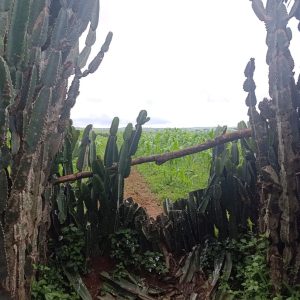
Ezekiel Yakubu, the youth leader of Bindi, provided additional context to MBT: “They came in from Hayin Bangai to attack our village. They had in the past accused our community of killing a young herder, an accusation they couldn’t prove. The government knows the people carrying out these attacks against us and must be decisive, go into Bangai and ensure that the arms are recovered from the herdsmen and the perpetrators of this atrocity are brought to book.”
Sacred Ground Desecrated: Attack on the Community Church
Among the most disturbing aspects of the assault was the deliberate targeting of the community’s spiritual center. The Church of Christ in Nations (COCIN), the only church in Bindi and the spiritual heart of this Christian community, was systematically vandalized during the attack. Windows were shattered, chairs were broken, and the public address system along with other musical instruments were destroyed—a calculated assault on the community’s faith and identity.
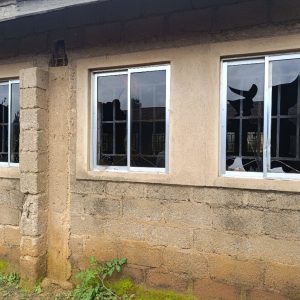
Rev. Davou Musa, who serves as the resident pastor of the COCIN church, witnessed firsthand how the attackers sought to destroy not just lives and property, but the very soul of the community. The targeting of religious infrastructure alongside residential homes suggests a coordinated effort to drive the Christian population from their ancestral lands permanently.
Explosive Evidence: Sophisticated Weapons and Tactics
MBT investigations revealed the sophisticated nature of the attack. Eighteen houses belonging to 27 families were destroyed using explosives believed to be calcium carbide—a substance that causes explosions on contact with damp air, water, or fire sparks. The use of such materials indicates a level of planning and resource access that goes far beyond spontaneous violence.
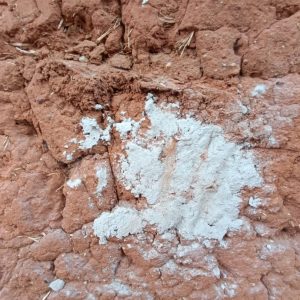
The impacts of these explosions were devastating and visible. Building roofs were completely blown off, leaving concrete evidence of the attackers’ intentions to cause maximum destruction. This marks a disturbing escalation in the weapons and tactics used against Middle Belt communities.
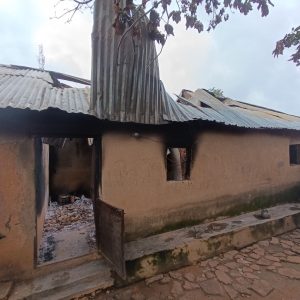
A Pastor’s Harrowing Testimony
Rev. Davou Musa’s account of the attack provides perhaps the most chilling insight into the attackers’ methods and knowledge. Having lost nine family members in the assault while witnessing the desecration of his church, his survival allows him to bear witness to the calculated nature of the violence.
“When they got to my house, which is the pastorium of the Church, they started hitting the gate for several minutes before they gained access to the compound,” he told MBT. “We had been hearing all the gunshots, weeping, and screaming from other victims being killed for over an hour. My house was the last they entered.”
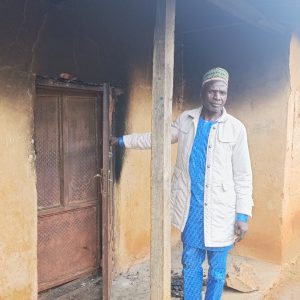
The pastor’s decision to hide in a room with goats, while his wife and another woman concealed themselves in an outside bathroom, proved life-saving. “One of the attackers came into the room I was hiding and saw the goats. He was excited, telling his other colleagues that he had seen some goats in Fulfulde. I understand a bit of Fulfulde, so I heard what he was saying. I believe God saved my life so I can tell the story of what truly happened on that day.”
The most damning revelation came from what Rev. Musa overheard: “When it was 5 am, they spoke in Fulfulde that ‘it is 5am, soldiers,’ meaning they knew exactly when the soldiers were going to show up in our community. And indeed, few minutes later the soldiers came in after over two hours of killings.”
[Part Two will examine the military’s controversial response, allegations of complicity, and the broader implications for security in Nigeria’s Middle Belt region.]


